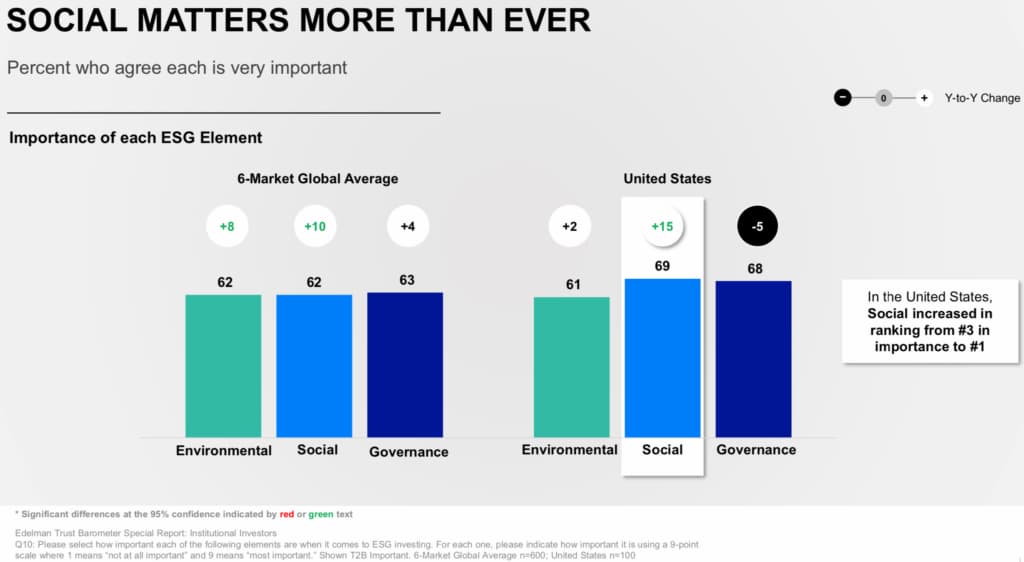How open data can improve diversity and inclusion
2020 has been both a good and a bad year for gender equality in the workplace. On the one hand, there have never been more women in senior management positions, on the other hand women have been disproportionately affected by remote working, layoffs, and furloughs. What perspectives for 2021?

2020 has been both a good and a bad year for gender equality in the workplace. On the one hand, there have never been more women in senior management positions, on the other hand women have been disproportionately affected by remote working, layoffs, and furloughs. What perspectives for 2021?
Much uncertainty surrounds the upcoming year, but one thing seems certain: open data is set to play an increasingly important role in the diversity & inclusion (D&I) strategy of firms around the world. Curious to know what’s in it for your company? Read this article to find out!
The rising prominence of social equity in corporate management
The annual Corporate Governance Trends by Harvard Law School found that Environment, Social and Governance (ESG) considerations have been trending on top of corporate agendas this year, with Social ranking highest in the US, according to a recent JUST Capital survey. What is driving this shift in priorities?
First, investors are increasingly sensitive to ESG issues. Over the past few years, institutional investors have used their rising voting power to push for greater gender diversity in boards. Second, shareholders and employees have grown more responsive to social movements, such as #MeToo and #BlackLivesMatter. Employee-shareholder activism has in fact led many corporate leaders to address and take a position on these and other social and political issues. Lastly, regulation increasingly requires disclosure of diversity and inclusion indicators.
The most regulated region is, as usual, the EU, where in 2018 the Non-Financial Reporting Directive entered into force. It mandates the reporting of the policies, outcomes, risks, and performance indicators relevant to several ESG categories, including employee treatment and board diversity (the collection of ethnic and racial data is still forbidden in several European countries). Canada, too, recently passed legislation in this field. The 2020 Business Corporations Act requires the disclosure of diversity policies and of the representation of women, indigenous peoples, persons with disabilities and minorities in the board and senior management. The US, instead, has a different approach: companies with more than 100 employees must report to the Equal Employment Opportunity Commission (EEOC) some 180 datapoints on employee gender and ethnicity, but they are not required to publish the data. As a result, in 2020 only 39% of companies in the Russell 1000 Index were releasing information on their gender composition and even fewer (4%) disclosed data on all the indicators required by the EEOC.

Open diversity data on both sides of the Atlantic
All these factors have led, especially in the US, to widespread calls for more transparent ESG reporting, particularly for gender and ethnicity- and the corporate world has responded. In September 2020, 34 of S&P 100 companies agreed to disclose their annual EEO-1 Survey data after a request by the New York City Comptroller and Retirement System. The adhering corporations operate in the most diverse sectors and include giants such as Amazon, BlackRock, General Motors, PayPal, Starbucks, Visa, and Verizon. Soon afterwards, in October 2020, 22 investor organizations launched an initiative asking all Russell 3000 companies to disclose data on their Board composition, following in the steps of another high-level multi-stakeholder initiative, the Thirty Percent Coalition. These campaigns have the potential to give new momentum to projects like Open Diversity Data, a portal that collects in one place all EEO-1 Survey and diversity data disclosed by different US corporations over various years.
An alternative to shared diversity data repositories is to launch your own ESG open data portal, as some European corporations are already doing. A great example is provided by Vallourec, a France-based multinational manufacturing company which in 2019 started to disclose its ESG information as open data. The Group chose to focus on social indicators, especially on women employment, with two objectives in mind: give substance and visibility to its Corporate Social Responsibility commitments and structure the information needed to design fact-based, targeted, and meaningful D&I policies.
The 5 reasons why you should rely on open data in your D&I strategy
Sharing ESG and, more specifically, D&I information as open data is clearly an effective way to meet the rising demand for transparency of shareholders, employees, customers, and regulators and to stay ahead of discussions on gender and racial equality. But it can also bring many advantages to your business- here are some:
- Ensure access to capital: institutional investors are increasingly focused on ESG performance
- Boost corporate reputation: data disclosure gives substance to your D&I commitments
- Enhance your competitiveness: you might be an open data pioneer in your sector
- Improve your risk analysis and monitoring capabilities: structured D&I data makes it easier to spot criticalities and to track progress
- Promote data-driven decision-making: the best D&I strategy is the one based on evidence
If you are looking for a customized ESG open data portal contact the ODS team: we’ll be happy to develop with you the most adequate solution to your corporate profile!



